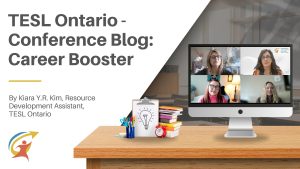By Kiara Y.R. Kim, Resource Development Assistant
The Career Booster Forum held on Thursday, November 9, 2023, from 1:30 to 2:30 pm, attracted participants eager to gain insights into employer expectations, resume-building, and effective interview practices. The event featured seasoned professionals sharing employment opportunities as well as their hiring expertise to empower new adult ESL teachers.
Employability at St. Charles
The St. Charles Adult and Continuing Education Centre offers programs in a number of categories which include English language instruction: ESL/LINC classes, citizenship, IELTS, English for Everyday Living, Care for Newcomer Children (CNC), and VISITORs. Holly Bartoszek (Supervisor) and Melita Vrakela (Lead Instructor), both from the ESL/LINC program at the Hamilton-Wentworth Catholic District School Board (HWCDSB), provided a detailed presentation of employment opportunities and hiring expectations at St. Charles. Successful candidates would begin on the supply list, then apply for permanent positions that become available. Some of the qualifications outlined included:
- TESL Ontario Certified (OCELT)
- Ability to instruct ESL according to CLB
- Familiarity with PBLA
- Evaluate student learning outcomes on an ongoing basis
- Engage in accurate St. Charles reporting process
Continue reading →










